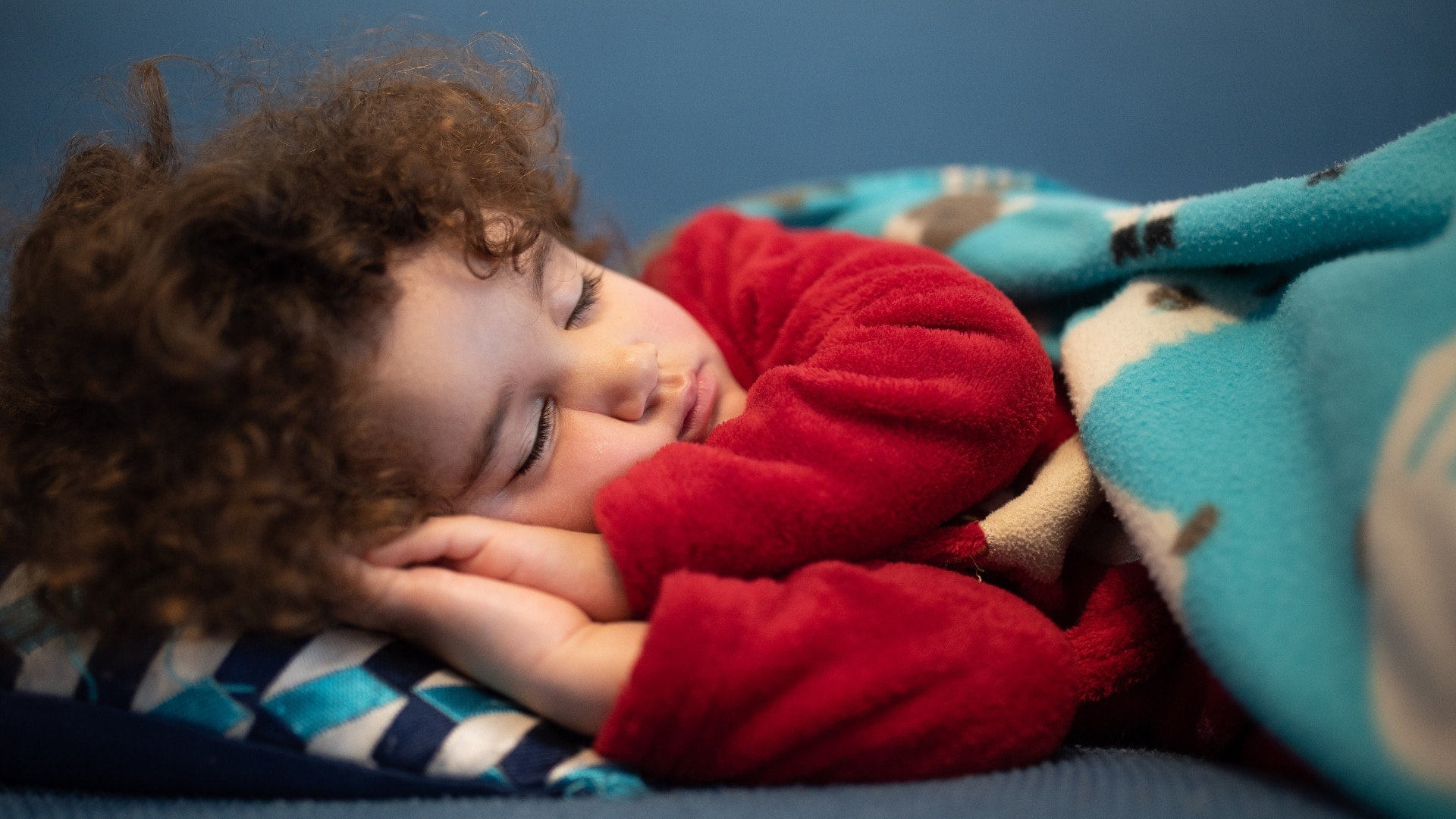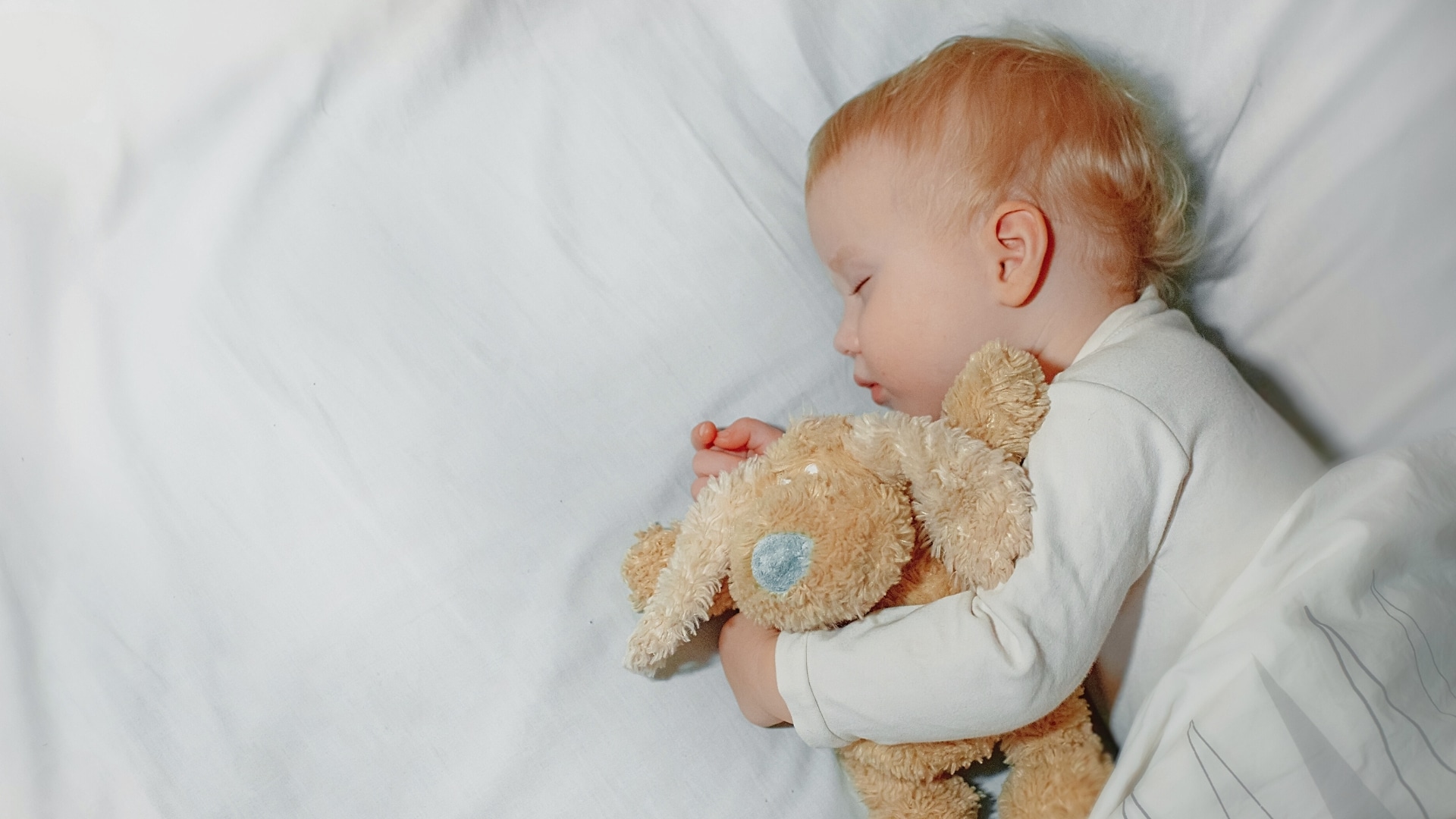With over 40 years of childcare experience as a Norland Nanny who has specialized in sleep problems, I have helped COUNTLESS families get their sleep back on track with the aid of sleep training.
I have read the reports, researched the medical advice, and listened to my fellow experts, but now I’m here to impart my knowledge about when to start sleep training… at the RIGHT time for you.

Table of Contents
What Is Sleep Training?
Sleep training is when you teach your baby to fall asleep independently and sleep through the night. It involves developing healthy sleep habits and breaking negative sleep associations. This is done by gradually teaching your baby to fall asleep on their own without the need for external soothing, such as contact napping, being rocked, or being fed to sleep.
When To Start Sleep Training
It is recommended by The American Academy of Pediatrics to start thinking about sleep training when your baby is between 4 to 6 months old.
At this stage, most babies are physically capable of sleeping through the night without the need to feed and even those who do need to feed at night can be taught to fall back to sleep quickly.
However, you must remember that every baby is unique, and what works for one may not work for another…
Now, in over 40 years as a Norland Nanny, I have helped many families overcome sleep problems and reestablish healthy sleep routines.
And from my experience, I believe that the ideal time for sleep training is between 6 and 10 months old.
This is because now baby is slightly older, forming a consistent routine is far more likely to happen. Your baby is also developmentally able to sleep through the night without waking (if you continue to use a dream feed) and as a result, establishing good sleep habits at this age can make the path to self-soothing much easier and contribute to better sleep quality for your baby.
But if you’re reading this and panicking because your baby is older than 10 months old… Please don’t!
It’s never too late to start sleep training.
You can sleep train at 12 months, 18 months, 2 years, 3 years, 4 years, and beyond, the only difference will be the tactics you use to help your little one self settle and sleep independently.
To learn more about how to sleep train at older ages, read my in-depth articles:
- How To Sleep Train An 8-Month-Old
- How To Sleep Train 9-Month-Old Babies
- Sleep Training A 10-Month-Old Baby
- How To Sleep Train An 11-Month-Old
- How To Sleep Train A 1-Year-Old
- Sleep Training An 18-Month-Old Toddler
- How To Sleep Train A 2-Year-Old
- How To Sleep Train A 3-Year-Old
- How To Sleep Train A 4-Year-Old
Looking to get your little one to sleep quickly and effortlessly? Check out my Bedtime and Nap Cheat Sheet and master the art of making daytime naps and bedtimes as seamless as possible.
A bedtime & nap cheat sheet so good your little one will ask you to put them to bed...
Laura Williams "This is a life saver! I'm so glad I downloaded your bedtime & nap cheat sheet. My little one actually asked me to put him to bed last night! Unbelievable! Thank you so much!"
Click Here For The FREE Cheat Sheet
How To Know When Your Baby Is Ready For Sleep Training
It can be hard to know when your baby is ready for sleep training but there are a few telltale signs that can indicate that you can start thinking about gently guiding them towards self-soothing.
Here are some key signs to look for:
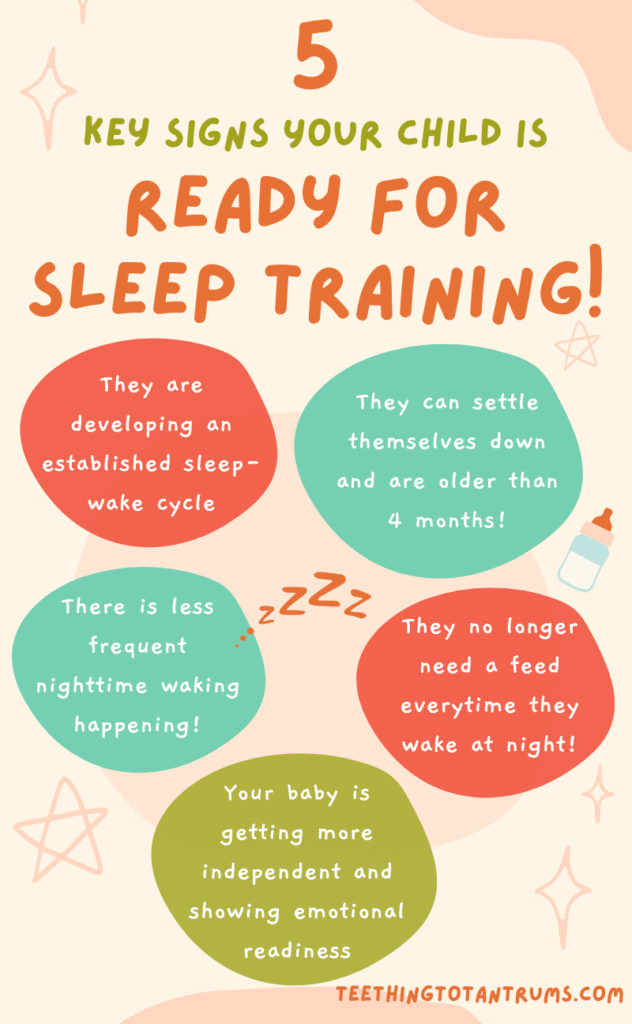
- Established Sleep-Wake Cycle: This is your first true indicator that your little one is ready for sleep training. Usually around four to six months old, babies develop a more predictable circadian rhythm which dictates their sleep and wake windows. So if your baby starts to show more regular sleep and wake times, it might be a good time to introduce sleep training.
- Ability to Self-Soothe: Babies need to be able to calm and settle themselves to fall asleep independently. Self-soothing skills may include sucking on fingers or a pacifier or grabbing a comfort object. All of these will help your baby settle and manage to fall asleep independently and therefore be ready for sleep training.
- Reduced Night Feedings: As your baby grows, the need for night feedings usually decreases. If your baby can go longer stretches without feeding at night, it is a good indicator that they are almost ready for sleeping. Knowing that your baby does not need to be fed every time they wake at night can make sleep training easier.
- Emotional Readiness: If your little one is showing signs of being more independent then this is another good indicator that they may be ready for sleep training. Maybe they are even falling asleep independently occasionally already.
- Less Frequent Night Waking: If your baby starts to experience fewer episodes of night waking, this could indicate that their sleep is maturing and they’re better at connecting sleep cycles without your help.
By tuning into these signals, you will be better positioned to start sleep training at a time that suits your baby’s natural development and individual needs.
There are also a few key healthy sleep habits that you must have in place BEFORE you start a conventional sleep training method.
I have advocated these tips to parents throughout my nannying career and on many occasions, have avoided parents having to sleep train at all!
- Have an age-appropriate sleep schedule in place that accommodates your baby’s awake windows. You will need to know how much age-appropriate sleep your little one needs in 24 hours too. To learn more about your little one’s sleep schedules, read these posts: From Newborn To Preschool: Sleep Schedules By Month
- Establish a recognizable and regular bedtime and nap time routine. Whether it’s cozying up with a book, singing a lullaby, having a bath, or having a cuddle, the recurring sequence of events leading up to a nap and bedtime will help establish strong sleep associations for years to come.
- Ensure your baby has an independent cozy sleep environment that is dimly lit and has a white noise machine to block out background noise. If baby is under 6 months, they will still be in your room, but ensure they have their own space within it. A crib is ideal for this and you can use a room divider to create a bit of separation. A nightlight is ideal for nighttime feeds as it prevents you from having to turn on a bright light at night!
- Make sure baby’s nutritional needs are being met. A hungry baby is a restless baby. A restless baby is a grumpy baby. And a grumpy baby will never sleep well. Make sure your baby is eating enough during the day and continue to use a dream feed for as long as you feel necessary to help your little one sleep through the night without hunger being a reason for nighttime waking. To understand how much food your baby needs per day from 0-12 months, read this wonderful article from Parents.com: An Age-by-Age Feeding Chart for Newborns and Babies
How Early Can You Sleep Train A Baby?
It is not recommended to try sleep training newborns; as they have unique sleep needs and require frequent feedings throughout both day and night which should never be compromised by any form of sleep training.
The earliest you should consider sleep training is 4 months, once baby has started to develop more regular sleep patterns.
If you’re uncertain about your baby’s readiness for sleep training, consult your pediatrician or sleep expert.
REMEMBER: It’s essential to ensure your baby is developmentally ready for sleep training and that you approach it gradually and with patience. In the early months, there is no quick fix. Some babies will naturally learn to fall asleep independently if all the right things are in place while others may struggle and take more time.
Is It Ever Too Late To Sleep Train?
NO! If you’re concerned that the window for sleep training has passed, take heart. There is no cutoff age for teaching healthy sleep habits to your child.
Teaching your child to fall asleep independently is beneficial regardless of their age.
Bear in mind that sleep training for older children requires different techniques and strategies than that of a younger baby especially if you are addressing behavioral problems that are arising from overtiredness and reaching developmental milestones.
TOP TIP: You should not attempt to sleep train your little one if there is a big change going on in their lives such as moving house, the arrival of a new sibling, potty training, or starting daycare.
Factors That Affect A Child’s Ability To Be Sleep Trained
If you’re wondering when to start sleep training, several factors will have a huge impact in the success of your sleep training efforts. These include:
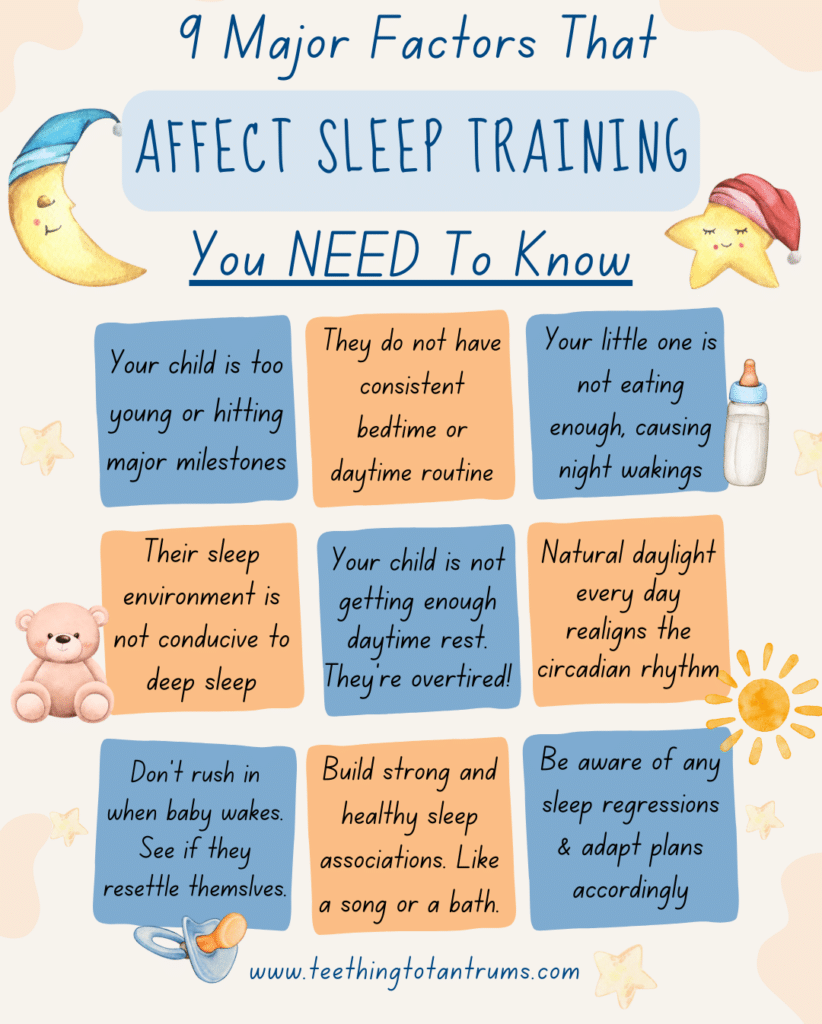
- Age and Developmental Milestones Your child’s ability to be sleep-trained is closely linked to their age and developmental stages. Before 4 months, babies have not developed their own melatonin or the regulation of sleep cycles, which are crucial for sleep training. By 4 to 6 months, most infants have started to develop self-soothing skills, making it an opportune time to begin sleep training.
- Consistent Bedtimes and Routines This one is always at the top of my list of must-haves when it comes to sleep training. Establishing a consistent recognisable bedtime routine will significantly help in sleep training. A sequence of calming activities that include a warm bath and reading a book signals to your child that night is for rest. Consistency and repetition of these routines help your child feel secure and understand what to expect, making it easier for them to fall asleep independently.
- Nutritional Needs and Weight Making sure your baby is well-fed throughout the day will help them sleep for longer stretches at night. Once your child is at an appropriate weight, typically around 14 pounds, you might not need to wake them for nighttime feedings and if they do wake you can start resettling them without feeding.
- Sleep Environment: A sleep-conducive environment in your baby’s room that is dimly lit and at the correct temperature. Use a white noise machine to prevent ambient noise from disturbing your little one.
- Daytime sleep: Ensure your little one is getting enough age-appropriate daytime sleep to avoid overtiredness which can disrupt the entire sleep schedule. Read my post on the 10-month sleep schedule to learn what to expect.
- Exposure to natural daylight: Get outside in the fresh air and natural light every day to balance your baby’s circadian rhythm and melatonin levels and promote healthy sleep.
- Your response to their waking: Don’t rush in every time your baby wakes. A little fussing is normal and they may re-settle on their own.
- Reliance on sleep associations: If your baby has always been rocked, fed or held to sleep you will need to wean them off this for them to learn to self-soothe.
- Sleep regressions: Understand that sleep regressions are a sign of your little one’s normal development and can occur at any age. They can disrupt sleep but with patience and consistency, they usually resolve on their own within a few weeks.
How Long Does Sleep Training Take?
The duration of sleep training often varies based on several factors… Mainly your baby’s temperament and the consistency of the sleep training approach that you choose.
It might take from 3 days to 3 weeks for a child to acquire solid sleep skills.
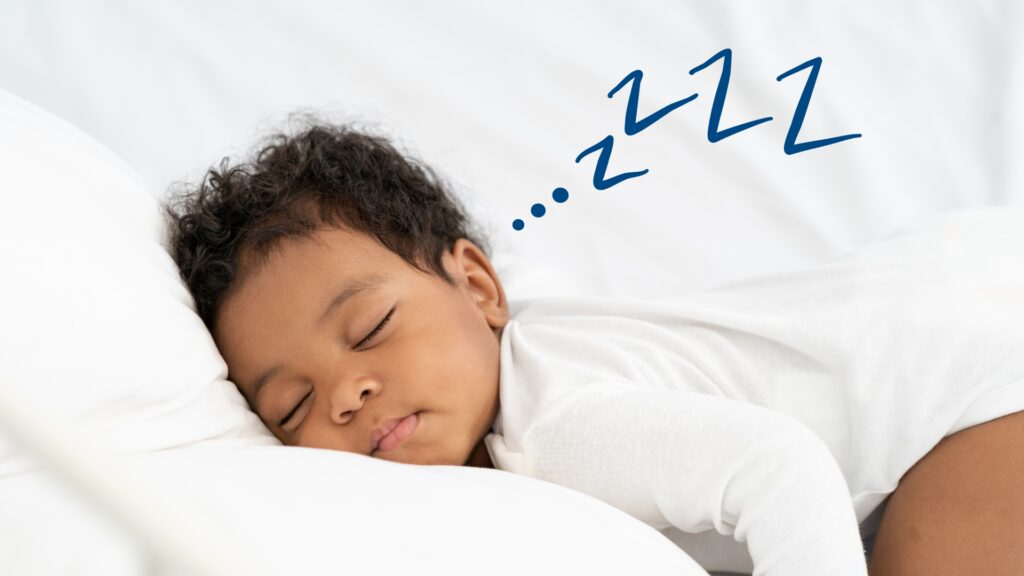
When To Start Sleep Training For Naps
If you’re thinking about when to start sleep training you might also wonder about when to start sleep training for naps… But there are two approaches you should be aware of when sleep training for naps.
- You sleep train for naps and bedtime at the same time
- Aim for bedtime settling first and then approach nap training afterward
There is no right or wrong method, but a lot will depend on your little one’s temperament. For young babies, you can usually do both at the same time while for older children it may be easier to concentrate on bedtime first and tackle naps at a later date.
You can start sleep training at nap times from 4 months onwards and are showing signs of having a regular nap routine.
What Are The Recommended Methods For Sleep Training?
There are several methods for sleep training, the success of which is determined by your child’s temperament, your consistency with the method, and what is happening in your family’s life at the time.
The most common methods include:
- The Chair Method
- The “I’ll Be Back” Method
- The Pick-Up, Put-Down Method
- The Self-Soothe Method
- The Ferber Method
- Graduated Extinction
- The Cry-It-Out Method
To learn more about these sleep training methods, read the following posts:
- Understanding The Most Common Sleep Training Methods
- The Ferber Method: A Proven Sleep Training Method For Infants
- The Truth About The Cry It Out Method From A Norland Nanny
NOTE: You should choose a method that you feel comfortable with and that suits your baby’s temperament and your family’s values.
Frequently Asked Questions About When To Start Sleep Training
In the journey of parenting, sleep training your baby is a significant milestone that often comes with many questions. This section addresses common queries to guide you through this process.
Q: How can I identify if my baby is ready for sleep training?
A: You can look for signs of readiness in your baby for sleep training, such as being able to sleep for at least five hours straight. Your baby should also have established a fairly regular sleep and wake cycle. If your child is consistently feeding well and gaining weight, it may be a good time to consider sleep training.
Q: Can sleep training have any negative effects on my child’s development?
A: There is no evidence to suggest that PROPER sleep training has negative effects on a child’s development. In fact, a study by the American Academy of Pediatrics divided infants into two groups – one went through sleep training, and the other did not. They measured the babies’ cortisol stress levels, parental satisfaction, parental stress, and the children’s attachment styles at one year old.
Results found that babies who were sleep-trained had decreased cortisol by the end of the training, indicating lower stress.
And at one year old, there was no difference in attachment style or behavior between the groups.
So with the right methods and environment, sleep training helps babies learn to self-soothe without negatively impacting development.
Q: How do developmental milestones affect the timing of sleep training?
A: Key developmental milestones such as learning to crawl or walk can affect your baby’s sleep patterns. These milestones might disrupt sleep temporarily so it’s usually best to wait until your baby has adjusted to these new skills before starting or reevaluating sleep training.
Q: What are some signs that my baby may not be ready for sleep training?
A: Your baby may not be ready for sleep training if they are going through a growth spurt or illness, which could disrupt their sleep patterns. Additionally, if your baby becomes extremely upset or if their feeding schedule is still irregular, it may be best to wait a bit longer before beginning sleep training.
Need More Parenting Help?
- Download our FREE Bedtime & Nap Sleep Cheat Sheet. It’s a free, easy-to-use and proven formula designed for parents of 0-5 year olds to master the art of consistently undisturbed and restful sleep without the yelling, nagging or exhausting long-winded evenings.
- Check out our Parenting Toolbox. You’ll get access to expertly-chosen products that you can guarantee are the best for your little one and your wallet.
- Are you looking for personalized guidance to navigate the challenges of parenting? I offer 1-on-1 consultations to bring you tailored strategies and actionable advice to help support your child's growth and well-being with confidence.

A bedtime & nap cheat sheet so good your little one will ask you to put them to bed...
Laura Williams "This is a life saver! I'm so glad I downloaded your bedtime & nap cheat sheet. My little one actually asked me to put him to bed last night! Unbelievable! Thank you so much!"
Click Here For The FREE Cheat Sheet
